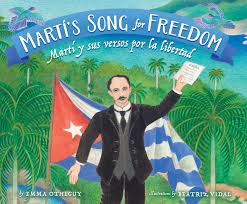Rated 5 stars ***** ARC. Viking Books (Penguin Random House). 217 p. (Includes “Author’s note,” “Gabriela Mistral’s poetry for children,” and “Further reading.”) To be published May 31, 2022.
Oriol misses her grandmother and Cuba. She, her parents and older sister moved to California to get special treatment for her grandmother’s diabetes, but it didn’t work. Due to trouble mastering English, she’s bullied at school and has learned to keep herself closed to others. She can be herself with the animals she helps her veterinarian father to care for, as she remembers Cuba and time spent with her beloved grandmother.
On one of her daily walks she meets a friendly woman named Gabriela Mistral, the first Latin American winner of the Nobel Prize in Literature, who helps her learn how to turn thoughts into poetry. Oriol is thrilled when she meets a friendly elephant who gives birth to twins, as spending time with them, writing poetry and singing with their elephant voices helps her feel better. Unfortunately their rich owner has other plans for the family. He believes elephants exist for his pleasure, so decides to take one of the twins to train for his own use. Without nourishment and love from its mother, Oriol knows the baby elephant will die. Can an eleven-year-old girl use her newly found voice to convince others they need to help her save its life?
Oriol’s words and thoughts flow through Margarita Engle’s poetic style of writing. As she learns to shape her poetic voice, and sing the song of elephants, young readers will also be excited to do so and learn how to sing too.
Recommended for ages 10-14.
I received an advance reading copy of this book from the publisher in exchange for an honest review.





 Esther’s father left his family behind in Poland and headed to Cuba, intent on earning enough money to give them a better life. Though he had been working for 3 years, he only had enough money for one of them to make the trip. Esther begged to be allowed to make the trip and, when she arrived, she was entranced. Cuba’s friendly neighbors made her feel welcome, everyone called her a little Polish girl instead of Jew, the weather was balmy, and the sea was breathtaking. It was wonderful!
Esther’s father left his family behind in Poland and headed to Cuba, intent on earning enough money to give them a better life. Though he had been working for 3 years, he only had enough money for one of them to make the trip. Esther begged to be allowed to make the trip and, when she arrived, she was entranced. Cuba’s friendly neighbors made her feel welcome, everyone called her a little Polish girl instead of Jew, the weather was balmy, and the sea was breathtaking. It was wonderful! Josef was almost thirteen-years-old in 1938 when
Josef was almost thirteen-years-old in 1938 when  José Martí
José Martí  Frank Delgado was born in the United States from parents who had fled
Frank Delgado was born in the United States from parents who had fled